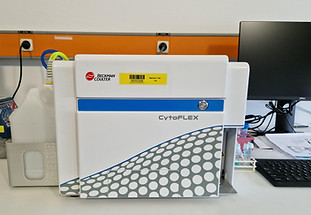
Immunohistology Facility






In our Immunohistology Facility, we carry out routine technics including tissue fixation and embedding, sectioning of paraffin sections and histological staining such as PAS, H&E, Picro Sirius red, F4/80, CD31, WT1, annexin II, CD44, Ly6G, aSMA&fibrinogen and so on to quantify for example tubular injury, immune cell infiltration, interstitial fibrosis, expression of adhesion molecules and occlusion of vessels in the kidney of mice. Our work further includes immunohistochemical detection of antigens in formalin-fixed, paraffin-embedded material but also in cryo-fixed tissue sections. In addition, we perform fluorescence staining of kidney tissue as well as cultured murine and human cells (e.g. NET formation of human neutrophils, right bottom image). Besides our expertise mentioned above, we conduct digital documentation and morphometric evaluation, genotyping using PCR, microscopy and immunoplotting.
Janina Mandelbaum, MTA
I've joined the Nephrology laboratory in March 2006 and since then, I've gained extensive expertise in all above mentioned technics and methods. Additionally, I am responsible for lab internal duties and train students in PCR, genotyping and microscopy.

Anna Anfimiadou, MTLA
I've joined the Nephrology laboratory in July 2019 and acquired substantial expertise in the above mentioned technics and methods. In addition, I am responsible for lab internal duties, organisation, ordering and training students.
Animal Facility
The laboratory’s animal facility houses and breeds mice only needed for our research. Our animals are kept under optimal husbandry conditions, guaranteeing both animal welfare and reproducibility of experimental research. They are housed and used according to the animal welfare legislation and current best practice standards. We work according to the principles of the 3Rs (Replacement, Reduction, and Refinement) to assure more humane animal research and we preferably use approaches that directly replace or avoid the use of animals in experiments. We keep the number of animal experiments as low as possible in the individual and optimized experiments. To promote awareness and responsibility among scientists and to ensure humane and high-quality in vivo research, we continuously educate and advise everyone involved during the planning and performing of experiments.

Maciej Lech, PhD
Head of the Animal Facility

Angela Lutterbach, Dr. med. vet.
Animal Welfare Officer

Yvonne Minor, Technical assistant
I am a trained and experienced animal technician at the Kidney Immunology Laboratory and joined in 2016. My responsibilities are on animal welfare, husbandry, breeding, and participating in continuing education programs to ensure improvement of standards wherever possible.

Uschi Kögelsperger, Technical assistant
I am a trained and experienced animal technician at the Kidney Immunology Laboratory and joined in March 2022. My responsibilities are on animal welfare, husbandry, and participating in continuing education programs to ensure improvement of standards wherever possible.
Technical Experts



In our Kidney Immunology Laboratory we also have a strong expertise with cell culture of murine and human cell lines as well as primary cells, perform functional assays to measure cell viability, cell migration, metabolic activity, phagocytosis, anti- and pro-inflammatory responses via flow cytometry, RT-qPCR and ELISA, and use siRNA technology to knockdown specific genes in cells to identify molecular mechanisms associated with kidney disease and inflammatory and fibrotic processes.

Anke Fischer, MTA
I am an experienced technician and joined the Nelson Lab in August 1996.
I am responsible for lab-related issues and tasks such as cell culture, mRNA studies, cloning, and training of students.

Sylke Rohrer, MTA
I am an experienced technician and joined the Lech Lab in 2001. I am responsible for lab-related issues and tasks such as cell culture and RT-PCR, training of students.
Contact
Kidney Immunology Laboratory
University Hospital
Ludwig-Maximilians University Munich
Clinical Unit:
Nephrologisches Zentrum
Ziemssenstr. 5, 80336 Munich
Research Unit:
Kidney Immunology Laboratory, Med. IV
Goetherstr. 31, 80336 Munich
Partners
BMC - Biomedical Research Center Munich
Medizinische Klinik und Poliklinik IV LMU Munich
University of Florence
University of Cracow
TRR 332 - Collaborative Research Center 332
TRR 156 - Collaborative Research Center 156
_tif.png)